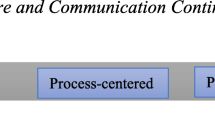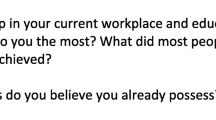Abstract
Purpose of Review
This review examines the current literature on the importance and role of communication skills of the clinician for patient motivation. Moreover, methods for teaching communication skills to the dental students are discussed.
Recent Findings
Good relationship between the clinician and the patient is essential for not only establishing mutual trust and satisfaction but also obtaining better clinical outcomes from the periodontal treatment.
Summary
Competency in communication skills for dental practitioners can be gained within the dental curriculum, and this will provide more sustainable benefits from the periodontal treatment. There is a clear need for development of specific models for gaining good communication skills within the context of periodontal treatment, and such models are to be implemented in the dental curriculum.

Similar content being viewed by others
References
Papers of particular interest, published recently, have been highlighted as: • Of importance •• Of major importance
Svensson L, Hakeberg M, Boman UW. Dental anxiety, concomitant factors and change in prevalence over 50 years. Community Dent Health. 2016;33(2):121–6.
Raadal M, Skaret S. Background description and epidemiology. In: Ost LG, Skaret E, editors. Cognitive behaviour therapy for dental phobia and anxiety. West Sussex, UK: John Wiley & Sons LTD; 2013. p. 21–31.
American Dental Education Association. ADEA competencies for the new general dentist. J Dent Educ. 2014;78:1030–3.
Broder H. Promoting interpersonal skills and cultural sensitivity among dental students. J Dent Educ. 2006;70:409–16.
• Azimi S, AsgharNejad Farid AA, Kharazi Fard MJ, Khoci N. Emotional intelligence of dental students and patient satisfaction. Eur J Dent Educ. 2010;14:129–32 This paper emphasizes the importance of emotional intelligence for dental professionals.
Salovey P, Mayer J. Emotional intelligence. Imag Cognit Personal. 1990;9:185–211.
Yoshida T, Milgrom P, Coldwell S. How do US and Canadian dental schools teach interpersonal communication skills? J Dent Educ. 2002;66:1281–8.
Okullo I, Astrom AN, Haugejorden O. Influence of perceived provider performance on satisfaction with oral health care among adolescents. Community Dent Oral Epidemiol. 2004;32:447–55.
Hurst YK, Prescott-Clemens-ts LE, Rennie JS. The patient assessment questionnaire: a new instrument for evaluating the interpersonal skills of vocational dental practitioners. Be Dent J. 2004;197:497–500.
Schouten BC, Eijkman MAJ, Hoogstraten J. Dentists’ and patients’ communicative behavior and their satisfaction with the dental encounter. Community Dent Health. 2003;20:11–5.
Hannah A, Lim BT, Ayers KMS. Emotional intelligence and clinical interview performance of dental students. J Dent Educ. 2009;73:1107–17.
Hottel TL, Hardigan PC. Improvement in the personal communication skills of dental students. J Dent Educ. 2005;69:281–4.
Freshman B, Rubino L. Emotional intelligence: a core competence for health care administrators. Health Care Manag (Frederick). 2002;20:1–9.
Hannah A, Millichamp CJ, Ayers KMS. A communication skills course for undergraduate dental students. J Dent Educ. 2004;68:421–8.
Orsini CA, Jerez OM. Establishing a good dentist-patient relationship: skills defined from the dental faculty perspective. J Dent Educ. 2014;78:1401415.
Axelsson P, Nyström B, Lindhe J. The long-term effect of a plaque control program on tooth mortality, caries and periodontal disease in adults: results after 30 years of maintenance. J Clin Periodontol. 2004;31:749–57.
Ramseier CA. Potential impact of subject-based risk factor control on periodontitis. J Clin Periodontol. 2005;32(Suppl. 6):283–90.
• Eickholz P, Kaltschmitt J, Berbig J, Reitmeir P, Pretzl B. Tooth loss after active periodontal therapy. 1: patient-related factors for risk, prognosis, and quality of outcome. J Clin Periodontol. 2008;35(2):165–74 This paper provides important evidence for the role of incompliance of the patients for tooth loss after completion of active periodontal treatment.
•• Newton JT, Asimakopoulou K. Behavioral models for periodontal health and disease. Periodontol 2000. 2018;78:201–11 This review provides important information on the existing state of behavioral models to be used in dentistry and describes a novel approach.
Renz ANJP, Newton JT. Changing the behavior of patients with periodontitis. Periodontol 2000. 2009;51(1):252–68.
Michie S, van Stralen M, West R. The behavior change wheel, a new method for characterizing and designing behavior change interventions. Implement Sci. 2011;6(1):42.
Beckman HB, Frankel RM. The effect of physician behavior on the collection of data. Ann Intern Med. 1984;101:692–6.
Dworkin SF. The dentist as biobehavioral clinician. J Dent Educ. 2001;65:1417–29.
Makoul G. Communication skills education in medical school and beyond. JAMA. 2003:289–93.
Evans BJ, Kiellerup FD, Stanley RO, Burrows GD, Sweet B. A communication skills programme for increasing patients’ satisfaction with general practice consultations. Br J Med Psychol. 1987;60:373–8.
Brattstrom V, Ingelsson M, Aberg E. Treatment co-operation in orthodontic patients. Br J Orthod. 1991;18:37–42.
Guo Y, Logan HL, Dodd VJ, Muller KE, Marks JG, Riley JL III. Health literacy: a pathway to better oral health. Am J Public Health. 2014;104:e85–91.
Fico AE, Lagoe C. Patients’ perspectives of oral healthcare providers’ communication: considering the impact of message source and content. Health Commun. 2018;33:1035–44.
Ratzan SC, Parker RM. Introduction. In: Selden CR, Zom M, Ratzan SC, Parker RM, editors. National Library of Medicine current bibliographies in medicine health literacy NLM Publ No. CBM 2000–1 Bethesda National Institutes of Health; 2000. p. v–viii.
Batista MJ, Lawrence HP, Sousa M. Oral health literacy and oral health outcomes in an adult population in Brazil. BMC Public Health. 2017;18(1):60.
Schillinger D, Grumbach K, Piette J, Wang F, Osmond D, Carolyn D, et al. Association of health literacy with diabetes outcomes. JAMA. 2002;288(4):475–82.
• Baskaradoss JK. Relationship between oral health literacy and oral health status. BMC Oral Health. 2018;18:172 This paper provides important information on the relationship between oral health literacy and oral health status of the patients, thus emphasizing the importance of good communication between patients and clinicians for better treatment outcomes.
Miller GE. Assessment of clinical skills / competence / performance. Acad Med. 1990;9:63–7.
Association of Canadian faculties of Dentistry. ACFD educational framework for the development of competencies in dental programs. 2016.
Field J, Cowpe J, Walmsley A. The graduating European dentist: a new undergraduate curriculum framework. Eur J Dent Educ. 2017;21:2–10.
• Ayn C, Robinson L, Matthews D, Andrews C. Attitudes of dental students in a Canadian university towards communication skills learning. Eur J Dent Educ. 2020;1:126–33 This paper provides important basis for the need of implementing communication skills learning into dental curriculum.
Carey JA, Madill A, Manogue M. Communication skills in dental education: a systematic research review. Eur J Dent Educ. 2010;14:69–78.
Rindlisbacher F, Davis JM, Ramseier CA. Dental students’ self-perceived communication skills for patient motivation. Eur J Dent Educ. 2017;21:166–74.
McKenzie CT, Tilashalski KR, Peterson DT, White ML. Effectiveness of standardized patient simulations in teaching clinical communication skills to dental students. J Dent Educ. 2017;81:1179–86.
Sischo L, Broder HL. Oral health-related quality of life: what, why, how, and future implications. J Dent Res. 2011;90:1264–70.
Backhouse C, McRae D, Iyer N. Report of the task force on misogyny, sexism, and homophobia in Dalhousie University Faculty of Dentistry. Halifax, Nova Scotia: Dalhousie University; 2015.
Rouse RA, Hamilton MA. Dentists’ technical competence, communication, and personality as predictors of dental patient anxiety. J Behav Med. 1990;13:307–19.
Ayn C, Robinson L, Nason A, Lovas J. Determining recommendations for improvement of communication skills training in dental education: a scoping review. J Dent Educ. 2017;81:479–88.
•• Torper J, Ansteinsson V, Lundeby T. Moving the four habits model into dentistry. Development of a dental consultation model: do dentists need an additional habit? Eur J Dent Educ. 2019;23:220–9 This paper presents a modification in the four habits model to adapt it to the field of dental consultation.
Rao JK, Anderson LA, Inui TS, Frankel RM. Communication interventions make a difference in conversation between physicians and patients: a systematic review of the evidence. Med Care. 2007;45:340–9.
Fortin AH, Dwamena FC, Frankel RM, Smith RC. Research and humanistic rationale for patient-centered interviewing. In: Smith’s Patient-Centered Interviewing: An Evidence-Based Method. 3rd ed. New York NY: McGraw-Hill Medical; 2012. p. 247–54.
Nestel D, Betson C. An evaluation of a communication skills workshop for dentists: cultural and clinical relevance of the patient-centered interview. Br Dent J. 1999;187:385–8.
Stein T, Frankel RM, Krupat E. Enhancing clinician communication skills in a large healthcare organization: a longitudinal case study. Patient Educ Couns. 2005;58:4–12.
Silverman J, Kurtz S, Draper J. Skills for communicating with patients. 1st–3rd ed. Oxford, UK: Radcliff Medical Press; 1998. 2005 and 2013
Smith RC. The patient’s story. Integrated patient-doctor interviewing. Boston, MA: Little, Brown and Company; 1996.
Miller WR, Rollnick S. Motivational interviewing: helping people change. New York: NY:Guilford Press; 2012.
Miller WR, Rollnick S. The effectiveness and ineffectiveness of complex behavioral interventions: impact of treatment fidelity. Contemp Clin Trials. 2014;37:234–41.
Kopp SL, Ramseier CA, Ratka-Krüger P, Woelber JP. Motivational interviewing as an adjunct periodontal therapy-a systematic review. Front Psychol. 2017; February Vol 8: Article 279.
Jönsson B, Ohrn K, Oscarson N, Lindberg P. The effectiveness of an individually tailored oral health educational programme on oral hygiene behavior in patients with periodontal disease: a blinded randomized controlled clinical trial (one-year follow-up). J Clin Periodontol. 2009;36:1025–34.
Jönsson B, Ohrn K, Lindberg P, Oscarson N. Evaluation of an individually tailored oral health educational programme on periodontal health. J Clin Periodontol. 2010;37(10):912–9.
Needleman I, Nibali L, Di Iorio A. Professional mechanical plaque removal for prevention of periodontal diseases in adults-systematic review update. J Clin Periodontol. 2015;42(Suppl 16):s12–35.
Author information
Authors and Affiliations
Corresponding author
Ethics declarations
Conflict of Interest
The author declares that he/she has no conflict of interest related to this study.
Human and Animal Rights and Informed Consent
This article does not contain any studies with human or animal subjects performed by any of the authors.
Additional information
Publisher’s Note
Springer Nature remains neutral with regard to jurisdictional claims in published maps and institutional affiliations.
This article is part of the Topical Collection on Systemic Diseases
Rights and permissions
About this article
Cite this article
Buduneli, N. Communication Skills of the Clinician and Patient Motivation in Dental Practice. Curr Oral Health Rep 7, 202–207 (2020). https://doi.org/10.1007/s40496-020-00273-3
Published:
Issue Date:
DOI: https://doi.org/10.1007/s40496-020-00273-3




